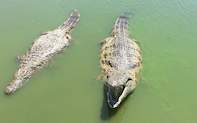Through the ages, crocodiles (of the family Crocodylidae) have been hunted for their skins, meat, claws, body parts and oil which have led to a dwindling in wild populations.

In 1973 the Convention on International Trade in Endangered Species (CITES) outlawed global trade (except from registered breeding farms) in crocodile skins to prevent the total decimation of wild crocodiles. Breeding these reptiles in captivity has eased the pressure on wild populations as CITES strictly regulates the sale of crocodile skins and related products.
In addition to hunting, a decline in water bodies and water pollution have led to further stress on wild crocodile populations.
The Benefits of Crocodiles
As an apex predator, crocodiles are at the top of their food chain and are therefore good indicators of what is happening in their environment. For example, monitoring the lead content in crocodiles can give an overview of pollution in the water.
In the wild, crocodiles open up channels and deeper pools of water which create a habitat for other water-dependent creatures, thereby increasing biodiversity in aquatic systems. In addition, preying on more abundant species increases resources for other species and can increase the amount of minerals such as calcium, magnesium, phosphorus and potassium in nutrient-poor waters.
Apart from the importance of crocodiles in the food chain and maintaining healthy aquatic life, crocodiles play an integral role in the cultural traditions of many people. These reptiles signify religious, social or political power and are deeply associated with cultural practices and identity in tribes all over the world.
What is Crocodile Farming?
Crocodiles are adapted to live in water, swim with webbed feet and float by regulating the air in their lungs, thereby exposing eyes and nostrils above the water surface.
They are meat-eating reptiles, hunting at night and living in rivers and swamps in warm tropical regions of the world.
Crocodile farming is the rearing of crocodiles for their skin, meat, fat, body parts or for live sales.
The Nile crocodile, one of over 20 crocodile species and the second-largest, has been farmed commercially in South Africa, as well as Mozambique and Zimbabwe, since the late-1960s.
Crocodile farms, however, are closed-cycle captive breeding systems with artificial housing, veterinary care and food where crocodiles are protected from predators and poachers. Adult animals are harvested for their skins, meat and other products, while some animals are kept as breeding stock.
Conservation of Crocodiles
While the CITES convention has managed to reduce the pressure on wild populations of crocodiles, poaching has nevertheless reduced and in some cases, eliminated crocodiles from the wild.
Wild populations of crocodiles are still at risk, however, not from poaching as much, but rather due to the change of their natural habitat caused by factors such as the building of dams, lower rainfall and water pollution. Between 2008 - 2012 large numbers of crocodiles died due to pansteatitis in the Loskop Dam and Kruger National Park, the cause of which is unknown.
Research on the Nile crocodile in South Africa was initially the focus of Tony Pooley who founded the Ndumo Crocodile Centre, now in St Lucia in the KwaZulu-Natal (KZN) province. From 1967 - 1977 his rearing and restocking of crocodiles helped replenish the wild crocodile population in KZN, decimated by decades of hunting.
Many researchers and veterinarians continued research and conservation efforts and current research of crocodiles, product development, compliance and marketing are done by the University of Pretoria’s Exotic Leather Research Centre, Exotic Leather South Africa (ELSA) and the South African Crocodile Industry Association (SACIA) which represents the crocodile industry.
Conservation of crocodiles in South Africa can indeed benefit from crocodile farming. Not only in restocking suitable habitats on game farms and reserves with animals but it also provides opportunities for crocodile research, especially in terms of crocodile health which will, in turn, benefit the health and conservation of wild populations.
By Marinda Louw